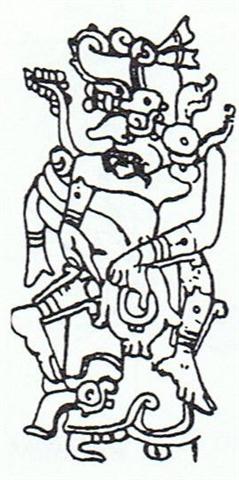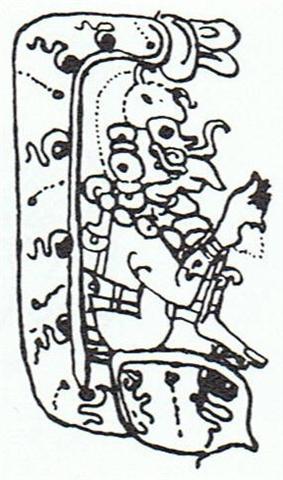1. After the kuhane of Hau Maka had made her reconnaissance flight over the island an expedition was prepared, in order to go there before the king himself would come: The brother (taina) Hua Tava spoke: 'Go and let King Hotu Matua know about your dream!' Hau Maka went to tell the king about the dream. When he arrived there, he told his dream. He described the dream in detail, including all lands his dream soul had seen. He omitted nothing whatsoever. After Hau Maka had spoken to King Matua, King Hotu Matua answered Hau Maka: 'You fared well in your dream, little king (ariki iti)! Now go back and send me young men!' (Manuscript E p. 13.) I cannot find taina in my lists of Polynesian words. But considering the idea I have presented earlier, at the pair of pictures with the Rain God making hewing gestures, the first part of taina could be ta-: 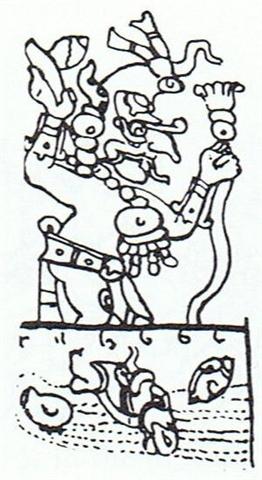 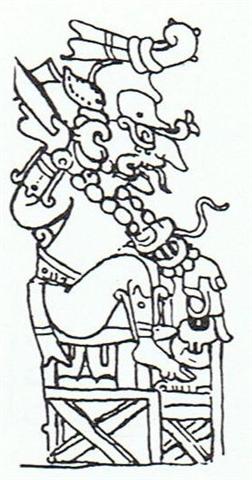 ... This kind of 'hewing' gesture would probably be called ta on Easter Island.
2 hewing figures (perhaps a pair in order to indicate '2nd' as in the
'2nd
part of the path of Sun') come after the first 5 - presumably
signifying 'fire', the months when the great 'fire' Sun is present:
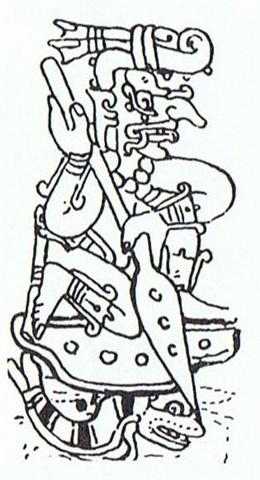 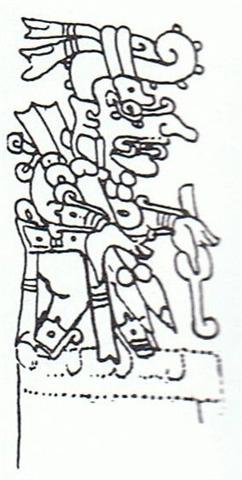
In the previously quoted introduction to Hawaiian astronomy we
read that aina
(kaiga) was the 'land' over which Sun ruled. The season when Sun
is
in the sky above is
a time of affluence (the opposite of flood), when
you can eat (kai) and grow fat. Thus kaiga should
be the 'land of
eating'. It becomes aina in the Hawaiian dialect.
Taina could therefore be a wordplay to indicate the opposite
of land, the
'land' of sea (tai):
Hau Maka, I have proposed, could be a name for the end of the 1st part of the year and his brother (taina) 'at the other end of the house', Hua Tava, could be at the end of autumn. They (or at least Hau Maka) were 'little kings' (ariki iti) according to the great king Hotu Matua. Maybe we should read his name as Hotu ma Tu'a = 'full moon' (hotu) together with (ma) 'the back side' (tu'a). Matua means parent, the age beyond the prime of life (spring time). Hotu ma Tu'a (Hotu Matua) would then be the season for creating offspring (hua). Wordplays are easy to imagine. To translate Hawaiian aina we first will think kaiga, the land ('ebb') north of the equator (= spring on Hawaii). Next we will realize it is the opposite season in the rest (or the major part) of Polynesia, i.e. tai-ga would in a way be better than kai-ga. However taiga is not good either, because -ga suggests a definite place of location, and in the sea there is no definite place at all, everything is fluid. Thus Hawaiian aina should be taina, a word which sounds very much like kaiga but which has tai instead of kai. My invented word taina cannot be identical with Hawaiian aina, because the Hawaiian dialect has no syllable ta, they use ka both for ta and ka The mystery of why they have discarded the consonant t on Hawaii may have its solution somewhere here. The whole archipelago lies north of the equator and it cannot be the same 'land' as on the normal islands south of the equator. Thus te should not be used on Hawaii, it ought to be ké (other, different). But the real sea (tai) down on earth should have neither: 'Ocean, sea (often used without an article); he-turu au ki tai hopu, I am going down to the sea to bathe.' Like Easter Island (which is said to have been threatened by sinking down into the 'sea') the Hawaiian islands do not belong properly in the 'land of Polynesia': ... Nga Tavake spoke to Te Ohiro: 'The land is sinking into the sea and we are lost!' But Te Ohiro warded off the danger with a magic chant ...
Although the land is different (ké) on Hawaii it is
anyhow a land ruled by Sun (excepting a part of the chain of
islands northwest of the main islands which lie outside of the
tropics). The archipelago is not a place of dearth ('death',
where Sun is taking a rest):
|

